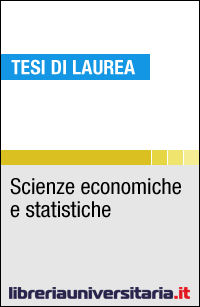
The business model canvas as a tool for the development of start-ups: an application to the rehabit case
- Tipologia:
Tesi di Laurea di secondo livello / magistrale
- Anno accademico:
2019/2020
- Relatore:
- Cristina Florio
- Università:
Università degli Studi di Verona
- Facoltà:
Economia
- Corso:
Economia del Commercio Internaz. e dei Mercati Valutari
- Cattedra:
group accounting and performance
- Lingua:
- Italiano
- Pagine:
- 173
- Formato:
- Protezione:
- DRM Adobe
- Dimensione:
- 6.31 Mb
Descrizione The business model canvas as a tool for the development of start-ups: an application to the rehabit case
Everyone has heard of the particular form of a business initiative called startup. This is mainly because of its ability to overwhelmingly enter the markets and having the ability to revolutionize them. However, while few know how this business actually works and how it is possible to implement it. Consequently, some might ask: how is a startup precisely defined? How does it really works and what are the requirements to start it and bring it to success? In this thesis, I first analyzed the expanding phenomenon of startups, focusing on how this form of entrepreneurial activity has historically evolved. The Silicon Valley area dominates this environment: high productivity of innovators when working in clusters has been empirically demonstrated and investors are mainly financing in this area, where there is a greater probability that a startup, capable of revolutionizing the market by earning millions of dollars, will be born. I then proceed by examining the economic and juridical profile of an Italian startup, focusing on defining the requirements demanded by the Italian regulation to be able to identify a startup as such. Accordingly, after clarifying the features of a startup, I persist with the analysis of how it is possible to finance it, which are the tools to do it and what the timing for a correct financial contribution to it. I then explore different types of possible investors, from business angels to venture capitalists, following a logic of temporal listing based on the economic growth of a startup. However, it turns out that the refusal of lenders is partially due to an unhealthy set-up of the financing system for startups, with a critic on venture capital funds. Furthermore, practical advice is suggested for a correct presentation of a startup idea to investors. As for the tools necessary for supporting the success of a startup, it is explained why the fixed composition of a predictive business plan is no longer adequate in developing a new category of emerging startups, i. E. Those based on the principles of the lean methodology. Indeed, startups that prefer more flexible management of the business, with greater attention to customer and market feedback, choose to make use of the business model canvas tool, whose components are illustrated in detail. Finally, a practical application of this tool to a potential startup of my invention: rehabit. I personally try my hand at drafting a business model canvas, running it step by step on the revolutionary idea of an e-commerce platform for the recycling of second-hand clothes, even implementing more traditional cost and revenue analysis. The whole picture of this work leads to the setting up of a new business for the development of an attainable lean startup.


